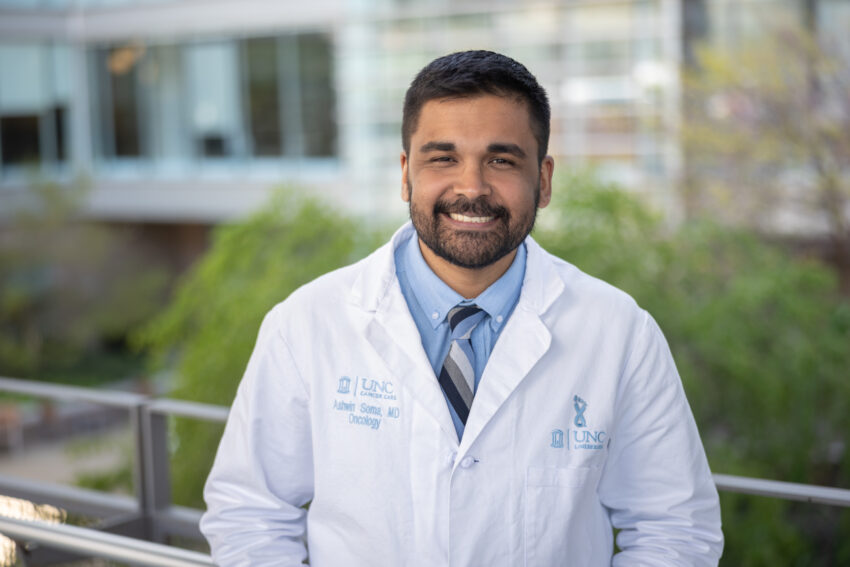
We’re proud to announce Ashwin Somasundaram, MD, as the newest member of the UNC Lineberger Pancreatic Cancer Center of Excellence (PCCE). Somasundaram joins the PCCE team from the University of Pittsburgh, where he began as an oncology fellow and served as an Assistant Professor of Medicine, a member of its Tumor Microenvironment Center, and Principal Investigator for the Hillman Cancer Center’s Cancer Patient Specimen Banking and Analysis Protocol.
In 2020, Somasundaram’s novel concept utilizing combination PD1/LAG3 blockade in solid tumors was accepted for ongoing development by the National Cancer Institute’s Cancer Therapy Evaluation Program (NCI CTEP). Such mechanisms of resistance and response in the tumor microenvironment will be his central focus within the PCCE, from the perspective of both immunology and cancer cell biology.
Investigating Tumors on the Single-Cell Level
During his work in Pittsburgh, Somasundaram collected and managed the majority of samples from patients with gastrointestinal cancers, genitourinary cancers and thoracic malignancies, and successfully utilized this protocol to provide human correlate data for the Hillman Cancer Center’s basic research efforts.
Somasundaram and his former cohort will soon publish findings from a study which evaluated Interleukin 6 and LAG3 as mechanisms of resistance to checkpoint blockade. This work, he says, “provided the preclinical rationale for my study concept accepted for further evaluation at NCI CTEP. I hope to be able to continue my work evaluating this pathway in humans to further investigate its role as a potential biomarker and therapeutic target.”
He also says he’s particularly proud of his work with Dr. Hatice Osmanbeyoglu, an Assistant Professor in the University of Pittsburgh’s Department of Biomedical Informatics, “specifically because of the innovative methodology we had to develop, combining single-cell RNA sequencing with a large Cellular Indexing of Transcriptomes and Epitopes by Sequencing panel.”
What Somasundaram brings to Chapel Hill
Asked how his previous research will translate to exploratory work with the PCCE, Somasundaram says, “While managing samples for trials and collecting new samples with our protocols at PCCE, I will be utilizing some of the novel methodologies I helped develop to assess the tumor microenvironment of pancreatic cancer.”
Somasundaram aims to develop meaningful and rationally designed clinical trials for our patients with pancreatic cancer. He also hopes to validate discoveries of checkpoint blockade resistance mechanisms found via animal models in ex vivo patient samples and in early phase clinical trials. More specifically, he hopes to learn how systemic inflammation leads to T cell dysfunction. These translational efforts could help the PCCE better understand meaningful biomarkers and new therapeutic combinations for patients with solid tumors. He will be leading many of the clinical trial efforts focused on pancreatic cancer.
We’re delighted to have Somasundaram continue his pioneering work within the UNC Lineberger Cancer Center, and we look forward to incorporating his research and methodologies to advance the PCCE’s goal of exemplary collaborative care for all patients.
—Tyler Rice, UNC Lineberger Pancreatic Cancer Center of Excellence
